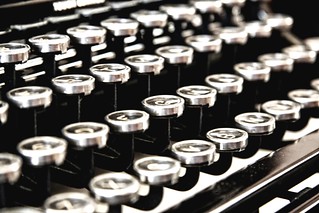I learned something interesting from a musician friend of mine last night. According to Rodney Thomas, a professional musician and my good friend from high school, when he plays piano, for the most part, his left hand runs on auto pilot. He can’t think about his left hand while he concentrates on his right hand. And at times, he has to switch his right hand to auto pilot so he can focus on his left for a few minutes.
It’s an interesting phenomenon. When we’re doing something multi-handed like playing piano or typing, our hands operate differently from each other. Our left hand truly does not know what our right hand is doing. We run on auto pilot for certain things.

As a writer, my auto pilot activity is typing.
It sounds weird, but I think good writers are also good typists. We should be writing so much that we don’t think about our typing, we think about the words that are coming out of our brains. The people who can’t type are struggling to write well, because their focus is on their hands and not their words.
For other good writers, they refuse to type anything because they don’t know how, so they write things long hand on legal tablets. They recognize that their typing is going to get in the way of their writing.
I’ve been typing for so long — since Mr. Carey’s Typing 1 class in 1983 — that I am a touch typist. I can turn my head and pay attention to a conversation. I can close my eyes and lean my head back. I can type right-handed while I hold a coffee cup in my left hand. And I have, on more than one occasion, started to fall asleep and continue typing for three or four sentences. It freaks my family out when I do that.
What’s weird is that I have such strong muscle memory for the way certain words are typed that if I misspell something or I transpose two letters, I can tell. My fingers move out of order and I can tell it as soon as I happen. That’s when I turn away from the conversation, or lift my head and open my eyes to fix the error.
As odd as it sounds, a good writing skill to practice is typing. The better you type, the less you have to concentrate on typing. The less you have to concentrate in typing, the more you can concentrate on the words.
So if you can’t type, start focusing on whatever you need to do to be a better typist. As you master that important-but-mindless skill, you’ll be able to focus on your writing.
Photo credit: sasa.mutic (Flickr, Creative Commons)